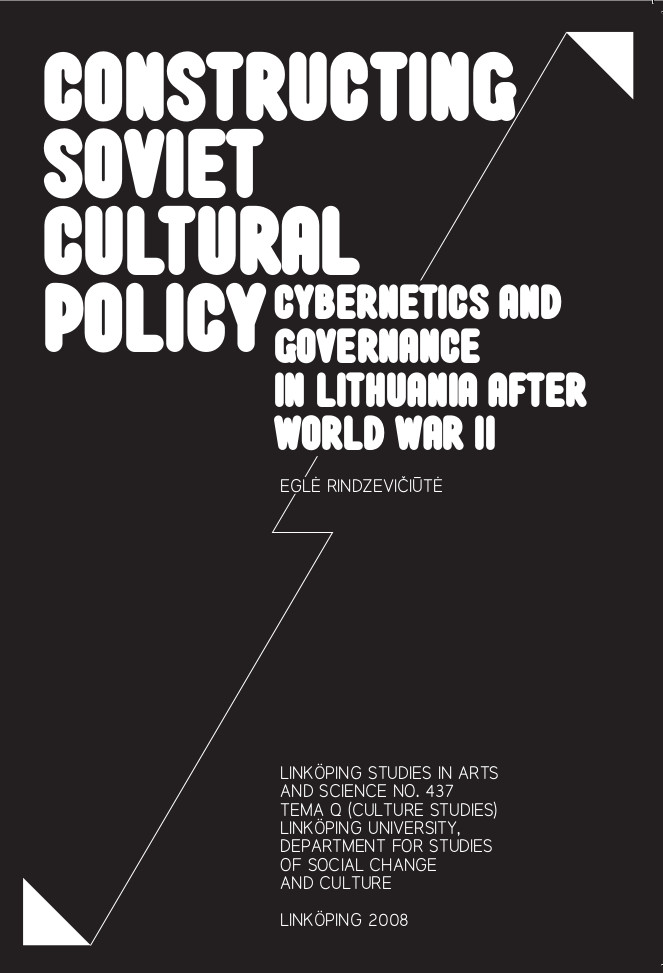Egle Rindzevičiūtė: Constructing Soviet Cultural Policy: Cybernetics and Governance in Lithuania after World War II (2008)
Filed under thesis | Tags: · cybernetics, governance, lithuania, politics, soviet union, technology

After World War I, the Soviet Union was one of the first modern states to engage explicitly in the governance of culture, which was formalised and institutionalised as state cultural policy. In this process of governance, sciences and technologies provided the state with conceptual and material resources, which were used to define both the process and the object of governance. After World War II, scientific and technological progress gave birth to a new science of control and communication, Norbert Wiener’s cybernetics, which was widely used not only in engineering, but also in the conceptualisation of humans, machines and societies. This thesis explores how cybernetics influenced the construction of cultural policy in the Soviet Union. It focuses particularly on the Soviet republic of Lithuania. The main argument is that since the 1950s a particularly powerful discourse of cybernetic governance was formed in the Soviet Union. A result of translation from techno-science, this discourse not only served the purposes of authoritarian rule, but was also used as a resource by cultural operators to criticise the Soviet government itself. By analysing organisational practices and official and public discourses, the study reveals the complexity of the relationship between governance, culture and sciences and technologies.
Doctoral thesis
Faculty of Arts and Sciences, Linköping University, 2008
274 pages
Sandra Braman: Change of State: Information, Policy, and Power (2006)
Filed under book | Tags: · copyright, data, governance, information policy, internet governance, law, politics, power, technology

As the informational state replaces the bureaucratic welfare state, control over information creation, processing, flows, and use has become the most effective form of power. In Change of State Sandra Braman examines the theoretical and practical ramifications of this “change of state.” She looks at the ways in which governments are deliberate, explicit, and consistent in their use of information policy to exercise power, exploring not only such familiar topics as intellectual property rights and privacy but also areas in which policy is highly effective but little understood. Such lesser-known issues include hybrid citizenship, the use of “functionally equivalent borders” internally to allow exceptions to U.S. law, research funding, census methods, and network interconnection. Trends in information policy, argues Braman, both manifest and trigger change in the nature of governance itself.
After laying the theoretical, conceptual, and historical foundations for understanding the informational state, Braman examines 20 information policy principles found in the U.S Constitution. She then explores the effects of U.S. information policy on the identity, structure, borders, and change processes of the state itself and on the individuals, communities, and organizations that make up the state. Looking across the breadth of the legal system, she presents current law as well as trends in and consequences of several information policy issues in each category affected.
Change of State introduces information policy on two levels, coupling discussions of specific contemporary problems with more abstract analysis drawing on social theory and empirical research as well as law. Most important, the book provides a way of understanding how information policy brings about the fundamental social changes that come with the transformation to the informational state.
Publisher MIT Press, 2006
ISBN 0262025973, 9780262025973
545 pages
Patricia Ticineto Clough, Craig Willse (eds.): Beyond Biopolitics: Essays on the Governance of Life and Death (2011)
Filed under book | Tags: · assemblage, biopolitics, governance, life, neoliberalism, politics, terrorism

Under the auspices of neoliberalism, technical systems of compliance and efficiency have come to underwrite the relations among the state, the economy, and a biopolitics of war, terror, and surveillance. In Beyond Biopolitics, prominent theorists seek to account for and critically engage the tendencies that have informed neoliberal governance in the past and are expressed in its reformulation today. As studies of military occupation, the policing of migration, blood trades, financial markets, the war on terror, media ecologies, and consumer branding, the essays explore the governance of life and death in a near-future, a present emptied of future potentialities. The contributors delve into political and theoretical matters central to projects of neoliberal governance, including states of exception that are not exceptional but foundational; risk analysis applied to the adjudication of “ethical” forms of war, terror, and occupation; racism and the management of the life capacities of populations; the production and circulation of death as political and economic currency; and the potential for critical and aesthetic response. Together, the essays offer ways to conceptualize biopolitics as the ground for today’s reformulation of governance.
Contributors: Ann Anagnost, Una Chung, Patricia Ticineto Clough, Steve Goodman, Sora Y. Han, Stefano Harney, May Joseph, Randy Martin, Brian Massumi, Luciana Parisi, Jasbir Puar, Amit S. Rai, Eugene Thacker, Çağatay Topal, and Craig Willse.
Publisher Duke University Press, 2011
ISBN 0822350173, 9780822350170
400 pages

